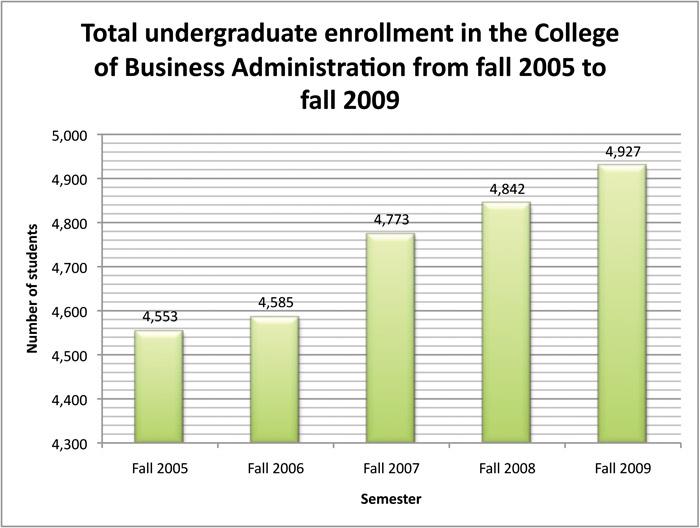College of Business Administration to limit enrollment for upcoming fall
November 9, 2010
Sacramento State’s College of Business Administration has declared impaction starting in fall 2011.
Russell Ching, the college’s associate dean for undergraduate programs, said because of the overwhelming number of applications, the College of Business Administration had to either increase its student capacity &- which would cost more resources &- or declare impaction. He said the impaction, which would not affect current business majors, will last indefinitely.
“It’s at the point, now, where money is tight,” Ching said. “Even if the student fee increase gets passed, that’s still not going to take care of the CSU’s problems. Given that it’s very unlikely that the university will allow us to expand our capacity, we have to start saying no to some students.”
The college will give priority to pre-business students with the highest cumulative grade point average.
“Our exact (grade point average) requirements will depend on the capacity of the college and the amount of graduating students we’re anticipating,” Ching said.
By declaring impaction, the college will limit the number of entering undergraduate business majors. This means upper division business majors will have less difficulty being admitted into the upper division classes required to graduate.
Ching said given the number of faculty, the college can only accommodate about 4,400 students. Right now, there are more than 5,000 business majors at Sac State.
“Under the current policy, we have to admit everybody who qualifies, but we only have so many faculty and resources to support our students,” Ching said.
From fall 2005 to fall 2009, the number of Sac State business majors steadily increased from 4,553 to 4,927, an 8 percent increase, according to the Office of Institutional Research.
In the past, about 1,200 students apply each year to become business majors, but given the resources, the college can take only about 500 to 700 students, Ching said.
“Not all students who apply, though, have Sacramento State in mind as their first campus of choice. Of those who applied, about 40 percent will come here,” Ching said.
Ching said impaction is occurring not only because of the high number of students applying as business majors, but also because of recent retirements of full-time faculty. Despite that, he said the college will do everything it can to provide a high-quality education to as many students as reasonably possible.
“We can take everybody in, but it would require us to run what we call “mega-sections,'” he said. “You don’t have this personal one-on-one relationship between the faculty and the student, and it’s almost like cattle-carting everyone around. Everybody just comes through, takes the exams, listens to the lecture, and out they go. I don’t think that is conducive to the quality of education that we would like to provide students with.”
Ching said business courses’ average class size is about 58 students &- almost double the average classroom size campus-wide. His goal is to lower the average to about 42 students.
If classes sizes are smaller, students would be more interactive, which would increase the quality of education offered to them, he said.
“When you have a large of class of about 55 to 60 students, you have a lot who are lost in the crowd,” Ching said. “They may have some good ideas, but because there is only so much class time in a single section, they may not be able to voice them. Instead of doing straight lectures, professors can put out discussion questions. I believe a lot of students can and will learn better if they can see the application of a concept the professor is trying to convey to the students.”
Ching said although he is very reluctant about denying students entry into the program, the impaction must be done in order to preserve the quality of the department’s education.
“If we had the resources to accommodate everybody, we would,” he said. “We’re not trying to be an elitist college. Right now we have been operating beyond our capacity, and I think it’s become very apparent that students are very dissatisfied with how we’re running things, because of the satisfaction surveys for exiting students. We rank very low. In fact, I think we’re the lowest on campus.”
Micah Stevenson can be reached at [email protected].
















































































































































